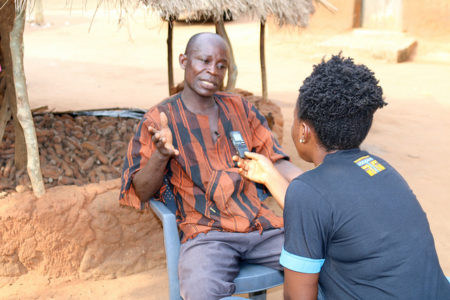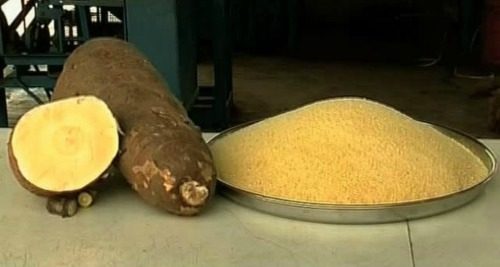
The Building Nutritious Food Baskets (BNFB) project, which works to accelerate and support scaling up of biofortified crops to help reduce hidden hunger, in collaboration with the Tanzania Food and Nutrition Centre (TFNC) and the Tanzania Agricultural Journalists’ Forum have launched the country’s first Biofortification Excellence in Journalism Awards.
The awards launched on March 21, 2018 are aimed at celebrating and recognizing journalists who report and create awareness on biofortification and hidden hunger in Tanzania.
Speaking during the launch, BNFB’s National Coordinator Dr. Richard Kasuga said that journalists throughout the country have one month to present well developed articles, features and other stories on biofortification and hidden hunger, which will be evaluated by a team of judges. Winners will subsequently be awarded prizes.
Biofortification, which is the process of breeding nutrients into food crops through conventional methods is already taking root in Tanzania, thanks to the Reaching Agents of Change (RAC) and the BNFB projects in collaboration with other implementing partners.
The awards, which will focus on all media categories (TV, Radio and print) are aimed at creating awareness and educating the masses on biofortification. The awards are also aimed at promoting and advocating for policy development, behavior change communication for demand creation as well as capacity development to support the scaling up of multiple biofortified crops.

While noting the importance of the media in awareness creation and sensitization, Dr. Kasuga expressed the need for more support in the implementation of policies, strategies and plans, as well as mobilization of resources in support of programs aimed at scaling up biofortification in the country.
“The BNFB project has prioritized the fast tracking of release of new varieties of Orange-fleshed sweetpotatoes, pro vitamin A (PVA) maize seeds and high iron beans as well as their dissemination to farmers,” said Dr. Kasuga, adding that the population needs to be aware of the existence and nutritive value of biofortified crops.
The BNFB project has partnered with the TFNC, and the Agricultural Journalists Association to build the capacity of journalists to be able to report on biofortification from an informed point.
Hidden hunger, which is characterized by chronic deficiency of essential vitamins and minerals is a major public health concern in Tanzania. Most of the people affected by micronutrient malnutrition do not show physical symptoms usually associated with malnourishment, hence the deficiency is commonly referred to as ‘hidden hunger’. Statistics indicate that 42 percent of all children under 5 years are stunted as a result of long term nutritional deprivation. The percentage represents over three million children spread across the various regions in Tanzania. According to the Tanzania Demographic and Health Survey (TDHS) the worst affected areas are Rukwa region (56 percent), Njombe (49 percent), Ruvuma (44 percent) Iringa (42 percent) and Morogoro (33 percent).
During the launch of the award, TFNC Officer in charge of Policy and Planning Mr. Geofrey Chiduo asked the journalists to use the opportunity to provide as much information as possible to the citizens on the availability of the biofortified crops.
BNFB’s Monitoring, Evaluation and Learning Specialist Godfrey Mulongo reiterated the need for journalists to include research and creativity in their reports saying that only captivating, well researched and informative pieces will provide the much needed information to the targeted populations.
BNFB project began in November 2015 and is funded by the Bill & Melinda Gates Foundation. In Tanzania, it aims at supporting initiatives aimed at reducing hidden hunger by catalyzing sustainable investment for the utilization of biofortified crops, including pro-vitamin A maize, orange-fleshed sweetpotato and high rich beans, at scale.




The BNFB project has made tremendous progress recording an increased number of households that have adopted the growing and consumption of biofortified crops in the country, but much more needs to be done to hit the target population with biofortified crops.
All entries are to be submitted at the CIP offices in Tanzania located at the International Institute for Tropical Agriculture in Mikocheni, Dar es salaam or via email to Ms Agnes Mrinji – a.mrinji@cgiar.org. Deadline for submission of entries is on April 20th 5pm. Winners will be notified by April 30th.
Article by Bevin Bhoke – Temporary Communications Assistant BNFB Tanzania
